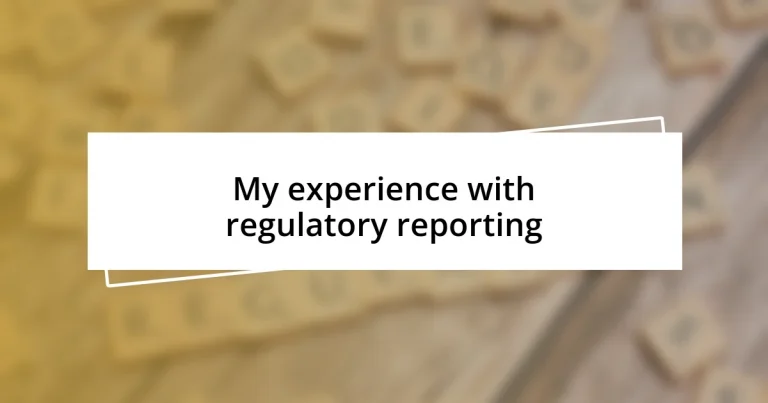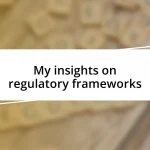Key takeaways:
- Regulatory reporting is essential for compliance, fostering transparency, and maintaining stakeholder trust, as it combines financial and operational data into a coherent picture.
- Effective compliance enhances organizational culture and minimizes legal risks, as demonstrated through personal experiences of facing potential fines due to missed deadlines.
- The future of regulatory reporting will increasingly rely on technology, automation, and improved collaboration between firms and regulators, shifting focus from manual processes to strategic analysis and insights.
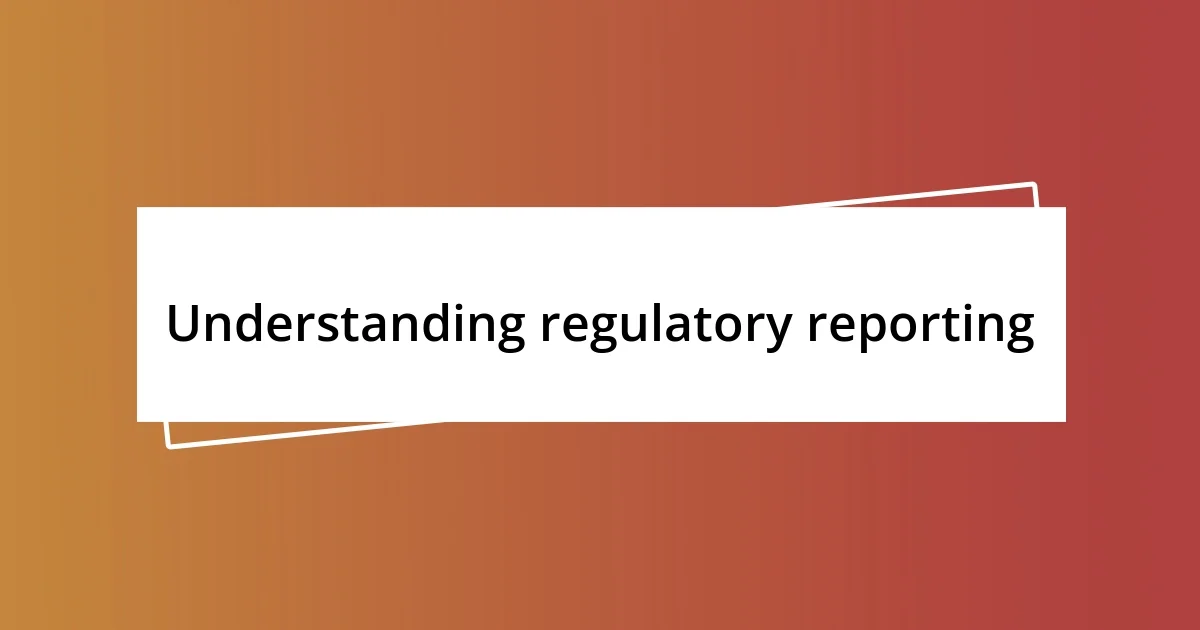
Understanding regulatory reporting
Regulatory reporting is essentially the framework in which organizations must disclose their financial and operational data to comply with laws and regulations. From my own experience, I remember the first time I navigated this process; I felt a mix of anxiety and determination. I couldn’t help but wonder, how do other companies manage to tackle such a daunting task seamlessly?
Think of it as a reporting puzzle that needs to be solved meticulously. Each piece, whether it’s financial figures, operational metrics, or compliance data, must fit together to create a complete picture that regulators can trust. I vividly recall a late-night session reviewing reports where I felt the weight of ensuring every number was accurate. It made me realize just how vital regulatory reporting is—not just to avoid penalties, but to foster trust with stakeholders.
In my journey, I discovered that effective regulatory reporting isn’t merely about checking boxes; it’s about building a culture of transparency and accountability. Have you ever faced a moment where a simple error turned into a major concern? I did, and it taught me that diligence in reporting can protect not just the organization but also its reputation. Every detail matters, and understanding regulatory reporting is a step toward responsible business practices.
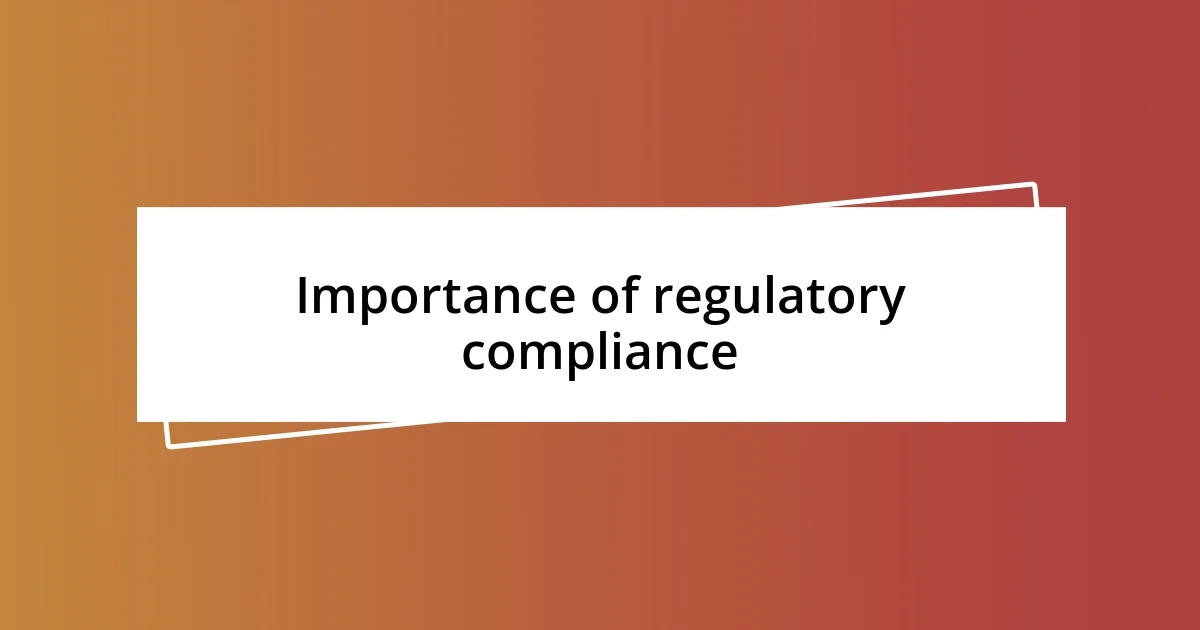
Importance of regulatory compliance
Regulatory compliance is crucial because it serves as a protective barrier between organizations and potential legal issues. I recall a time when a colleague of mine faced hefty fines simply due to a missed submission deadline. That experience emphasized how serious the consequences can be—beyond just financial penalties, there’s a risk to one’s professional reputation and the trust customers place in you.
Moreover, compliance helps foster a strong company culture centered around accountability. From my perspective, I find that when everyone understands the importance of adhering to regulations, it promotes a sense of unity and shared responsibility within an organization. It’s like everyone rowing in the same direction—without compliance, it’s easy for the organization to veer off course.
Ultimately, regulatory compliance enhances transparency, which is invaluable for building stakeholder confidence. Reflecting on my own experiences, I’ve seen firsthand how organizations that prioritize compliance often enjoy better relationships with investors and customers. It’s fascinating how a commitment to regulatory standards can drive broader success in the business realm.
| Aspect | Importance of Regulatory Compliance |
|---|---|
| Legal Protection | Avoids fines and legal repercussions. |
| Company Culture | Encourages accountability and shared responsibility. |
| Stakeholder Trust | Builds confidence among investors and customers. |
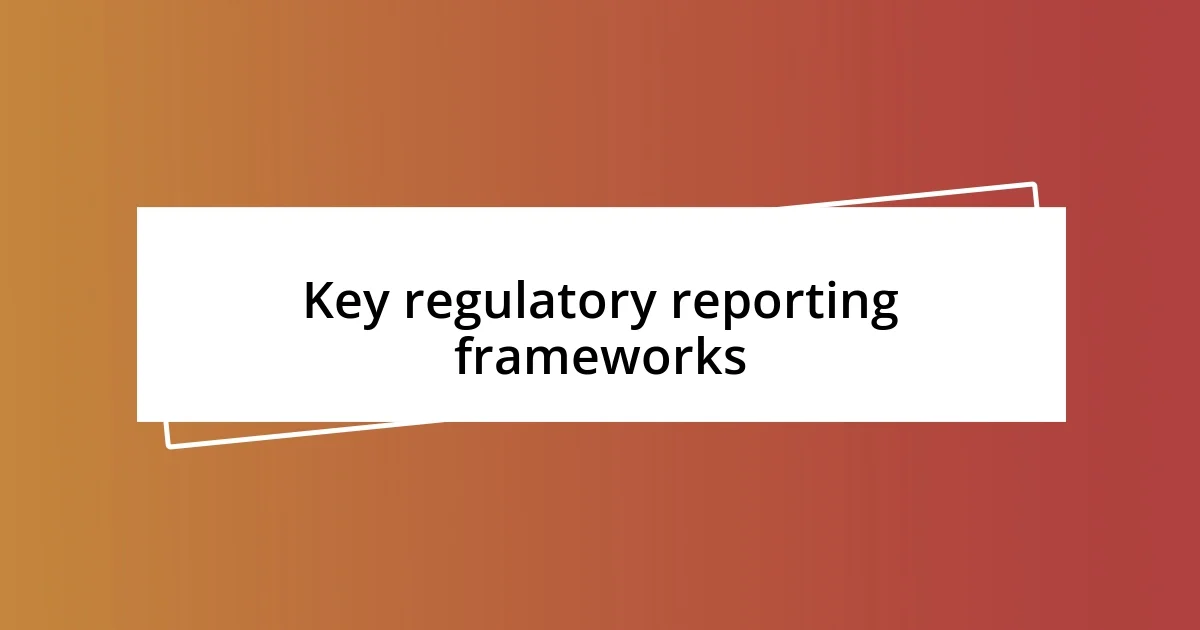
Key regulatory reporting frameworks
The landscape of regulatory reporting is shaped by several key frameworks, each designed to ensure organizations meet necessary compliance standards. I remember diving into the intricacies of frameworks like the Sarbanes-Oxley Act (SOX) and the Basel III Accord. They felt like formidable beasts at first, but over time, I learned their purpose: to enhance accountability and transparency in financial reporting and risk management, respectively. It’s insightful how these frameworks not only protect organizations but also offer clarity to investors and the general public.
Here are some of the critical regulatory reporting frameworks:
- Sarbanes-Oxley Act (SOX): Focuses on improving the accuracy of corporate disclosures, mainly for publicly held companies.
- Basel III: A framework that sets global standards for bank capital adequacy, stress testing, and market liquidity risk.
- International Financial Reporting Standards (IFRS): A set of accounting standards ensuring consistency and transparency in financial reporting across different countries.
- Dodd-Frank Act: Introduces reforms to increase transparency in financial markets and reduce risks, particularly in derivatives trading.
Reflecting on the Dodd-Frank Act was particularly eye-opening for me. The requirement to disclose risk factors meant we had to be more proactive than ever about risk management practices. This act pushed my team to adopt a forward-thinking approach, ensuring we had our risk assessments and data ready long before deadlines. Such frameworks can truly transform an organization’s mindset, making regulatory reporting not just an obligation but a cornerstone of strategic planning.
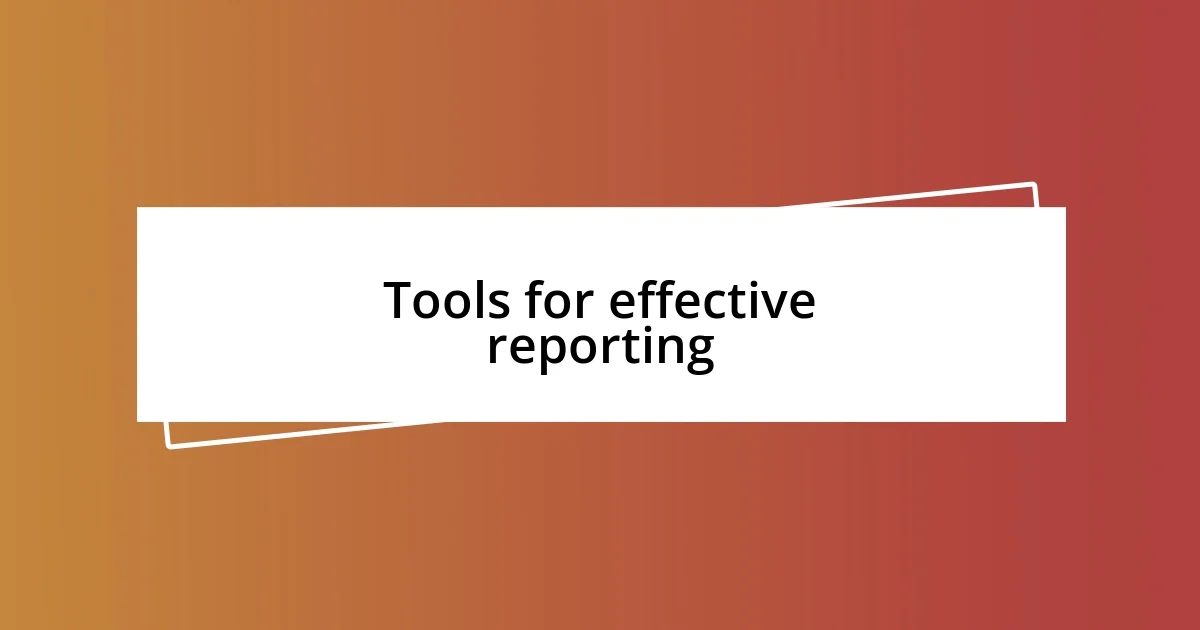
Tools for effective reporting
When it comes to tools for effective reporting, I’m always amazed by how technology can simplify what once seemed overwhelming. For instance, utilizing robust software solutions like Tableau or Power BI has transformed my reporting process. These platforms not only visualize data effectively but also allow for real-time updates, which I found especially beneficial during tight reporting cycles. Imagine the relief when my team could easily adjust our reports on the fly rather than scrambling last minute!
Another tool I’ve grown fond of is collaborative platforms like Microsoft Teams. They’ve made it easier for cross-department communication, which is essential when gathering diverse information required for regulatory reports. I remember a specific instance where I set up a dedicated channel for our compliance team, and it significantly reduced confusion. How can anyone argue with a straightforward communication tool that brings everyone together for a common goal?
Lastly, I can’t overlook the importance of checklists and automated reminders. On days filled with deadlines, I’ve relied on tools like Trello to keep my tasks organized and on track. There’s something incredibly satisfying about checking off completed items. It’s a small victory in a world where compliance can feel like an uphill battle. Have you ever felt that rush when you cross off a major task? It’s those little moments that help maintain motivation and clarity amidst the regulatory chaos.
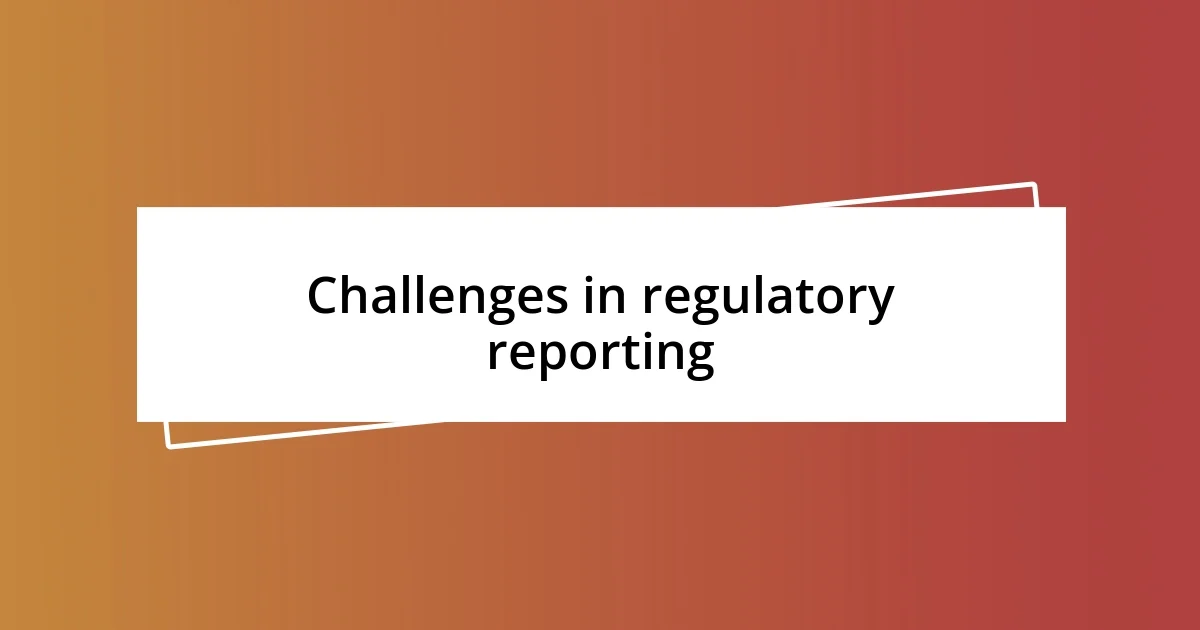
Challenges in regulatory reporting
I often found that one of the biggest challenges in regulatory reporting is navigating the labyrinth of constantly changing regulations. It’s almost like trying to hit a moving target! I remember spending countless hours untangling new guidelines only to realize that what I had just learned would shift again next quarter. It felt overwhelming at times, but I learned to embrace that uncertainty as part of the process—turning that challenge into a chance to stay agile and informed.
Data accuracy is another hurdle I encountered frequently. I vividly recall a situation where a minor miscalculation led to a cascade of issues that delayed our entire reporting cycle. The pressure was palpable, especially with deadlines looming. How do you recover from a blunder like that? In my case, it meant implementing more thorough verification processes and cross-checking data from multiple sources, transforming a stressful experience into an opportunity for growth and improvement. It emphasizes the importance of diligence in every single detail.
Then there’s the coordination between various departments, which can feel like herding cats at times. During one particularly chaotic reporting period, I had team members in finance, compliance, and operations all pulling in different directions. I found it crucial to foster a spirit of collaboration. Approaching my colleagues for input rather than issuing demands made a significant difference. Have you ever noticed how a simple invitation to co-create drives better engagement? Organizing cross-functional meetings became a game changer, moving us from a discordant tune to a well-orchestrated symphony.
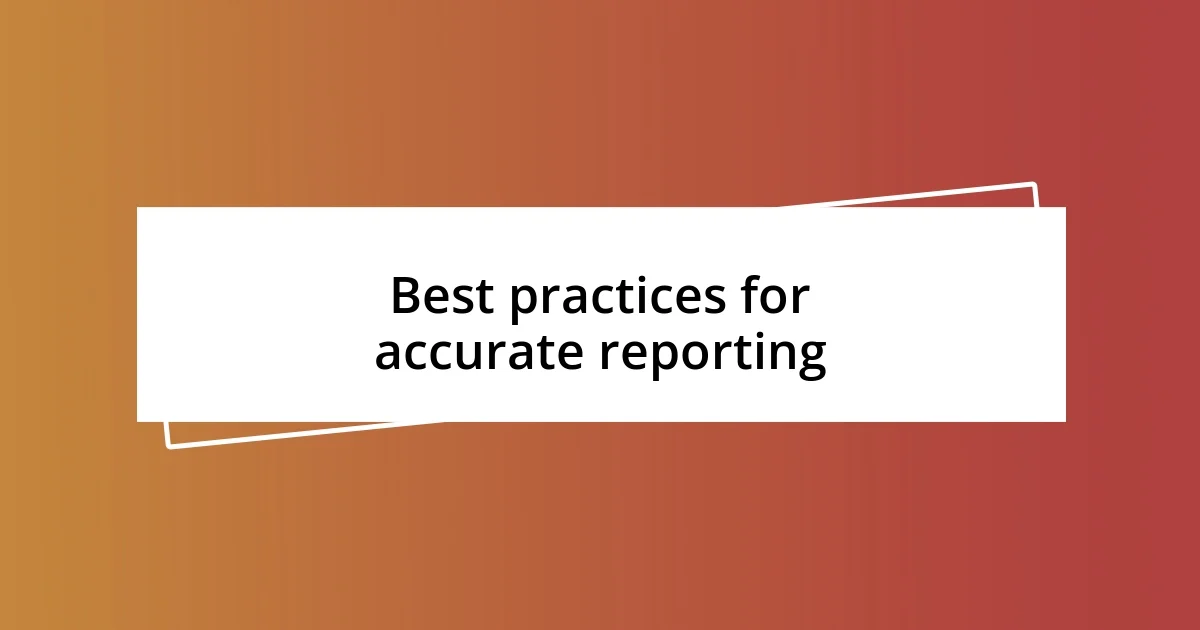
Best practices for accurate reporting
Best practices for ensuring accuracy in regulatory reporting are essential, and I’ve discovered a few that I find particularly impactful. First, establishing a culture of transparency is pivotal. In my experience, when team members feel comfortable asking questions, it leads to fewer misunderstandings. I recall a moment when a colleague hesitated to voice a concern about a report’s accuracy. Once we encouraged open dialogue, not only did we rectify potential errors, but we also fostered a stronger team dynamic. Isn’t it amazing how communication can transform the accuracy of our work?
Another best practice is implementing routine training sessions. I began organizing short refreshers on regulatory changes and reporting requirements, which made a world of difference. I vividly remember a workshop where we discussed the latest updates in regulations, and it sparked a lively discussion that clarified many confusions. This approach not only kept everyone informed but also boosted our confidence in handling complex data. When was the last time you learned something unexpected that changed your perspective? Those moments can truly redefine our reporting strategies.
Lastly, I’ve come to appreciate the power of feedback loops. After every reporting cycle, I initiated a review process that involved key stakeholders. It was eye-opening to see how various perspectives could enhance our understanding of what went well and what needed improvement. I remember the elation on my team’s faces when we found a minor issue and resolved it before it escalated. It’s incredible how embracing feedback can turn a daunting task into a continuous journey of improvement. Wouldn’t you agree that constructive criticism is often the catalyst for our best work?
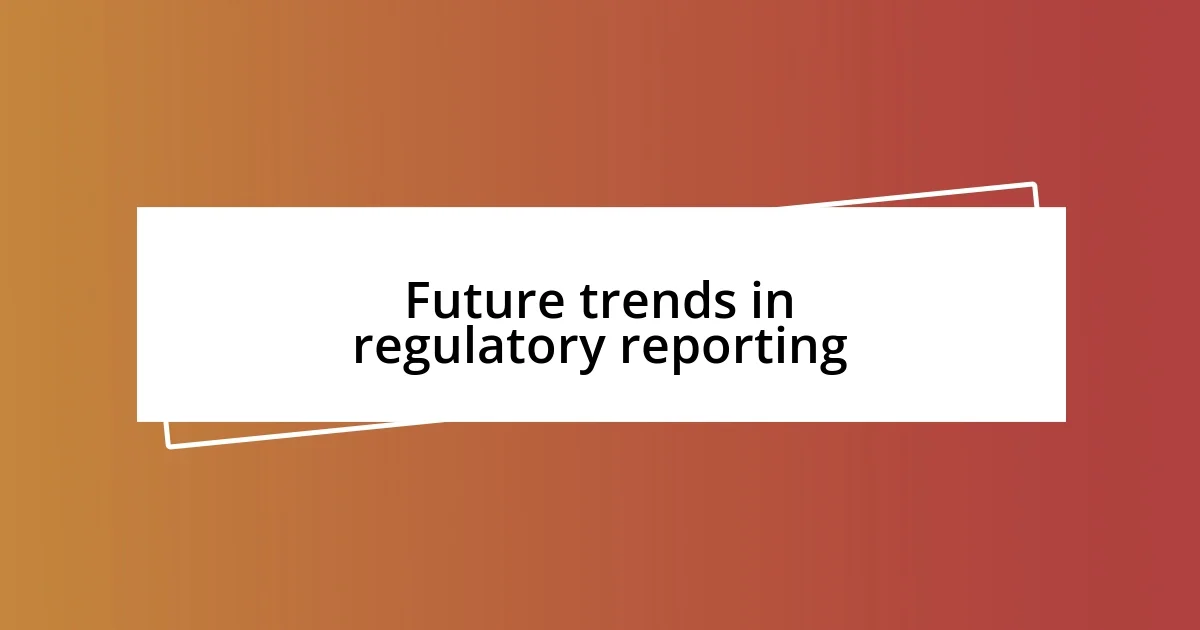
Future trends in regulatory reporting
Anticipating future trends in regulatory reporting truly excites me, as I see technology playing an ever-increasing role. For instance, automation, which I initially viewed with skepticism, has started transforming how I approach reporting. I remember a time when our team spent days manually compiling data. Implementing automated tools not only sped up our processes but also allowed us to refocus on strategic analysis rather than merely crunching numbers. Isn’t it fascinating how automation can shift our work from tedious to innovative?
In addition to technology, I believe data analytics will become a game-changer. I’ve witnessed firsthand the difference that advanced analytics tools can make. Once, during a particularly complex reporting cycle, the insights we gained from data analytics led us to uncover a trend we hadn’t considered before. That revelation shaped our approach to compliance and improved our overall reporting strategy. Have you ever found that a single data insight changed your perspective entirely? It’s moments like these that keep me passionate about the evolution of our field.
Lastly, the push for enhanced collaboration between firms and regulators is on the horizon. During my time working with different departments, I often felt there was a disconnect between the regulators’ expectations and our internal processes. A couple of times, I had the opportunity to participate in open dialogue sessions with regulators where they shared not just the “what” but the “why” behind regulations. I found that this kind of exchange is invaluable for building trust and clarity—creating a partnership rather than a checklist approach. Could this shift in perspective lead to more effective regulatory adherence? I have no doubt it will be crucial in shaping the future.












